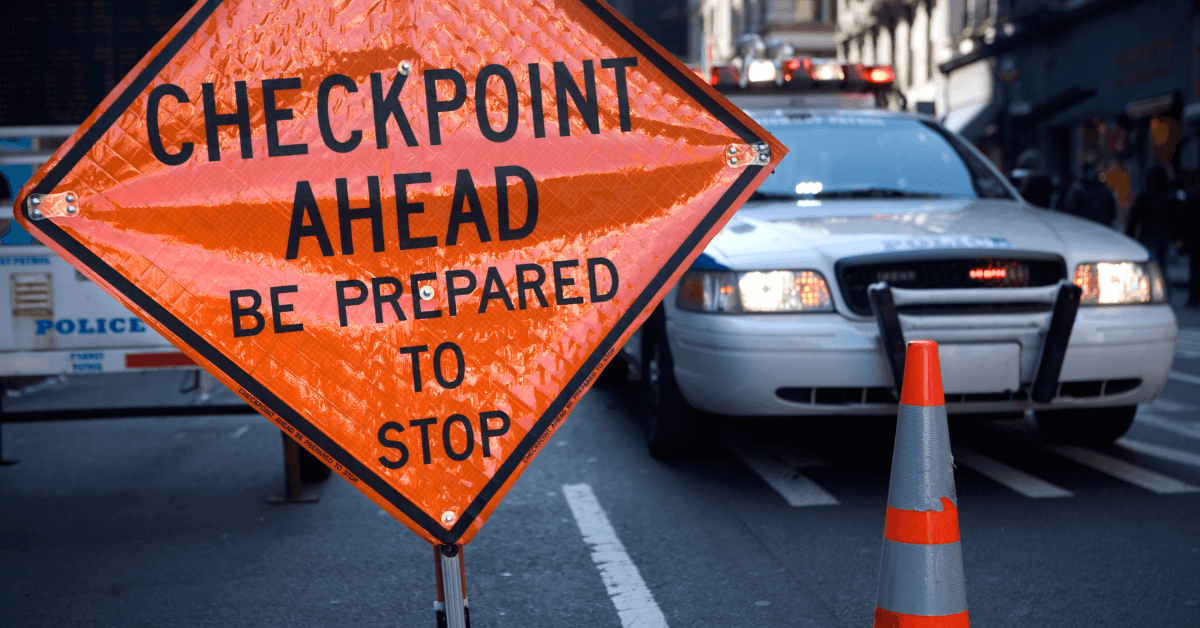DWI checkpoints are a standard tool used by law enforcement to deter and catch impaired drivers. In Missouri, these checkpoints are important for road safety. But they have their own rules and legal interpretations under criminal law.
Are DWI checkpoints legal in Missouri?
Yes, DWI checkpoints are legal in Missouri. However, they aren’t used as often as they were previously. These checkpoints allow officers to stop vehicles without specific probable cause, checking for signs of impaired driving. Despite concerns about constitutionality, the U.S. Supreme Court upheld the legality of checkpoints, balancing public safety against privacy rights. Missouri follows this framework, allowing checkpoints but ensuring they meet criteria such as public notice and predetermined stopping patterns.
Missouri courts require DWI checkpoints to adhere to specific guidelines:
- Transparency and Public Notice: Drivers must be informed of checkpoint locations in advance.
- Neutral Stopping Patterns: Officers must use systematic, unbiased methods for stopping vehicles.
- Limited Intrusion: Stops should be brief unless there is reasonable cause for further investigation.
These rules are designed to prevent arbitrary or discriminatory stops while maintaining public safety.
“Wolfpacks” and their role in DWI enforcement
While DWI checkpoints are stationary, saturation patrols, also known as “wolfpacks” provide a mobile, dynamic approach to impaired driving enforcement. A group of coordinated police units will patrol at specific times or in specific areas known for high DWI incidents. Unlike checkpoints, which focus on a single location, wolfpacks cover broader areas, allowing for adaptive monitoring and pursuit.
What to do when you encounter a DWI checkpoint or wolfpack
If you encounter a DWI checkpoint or wolfpack operation, knowing how to handle the situation can prevent complications:
1. Stay calm and comply
When directed to stop, follow officers’ instructions and remain polite. Officers are trained to look for signs of impairment, such as slurred speech or the smell of alcohol.
2. Understand your rights
You don’t need to answer questions that may incriminate you. While you should present your driver’s license and registration, you can refuse to answer other questions. Additionally, you are not obligated to consent to a search of your vehicle. If you feel uncomfortable, contact your attorney.
3. Field sobriety and chemical tests
Missouri’s implied consent law means that by driving, you agree to chemical testing if lawfully arrested. Refusing this test can result in a one-year license suspension, although you can decline field sobriety tests without an immediate penalty.
4. Avoiding checkpoints or wolfpacks
You can avoid a DWI checkpoint if you see one ahead, as long as your maneuver is legal. Officers in wolfpack units often watch for drivers attempting illegal U-turns or evasive actions, so follow all traffic laws. DWI checkpoints and wolfpack operations are critical tools in Missouri’s efforts to prevent impaired driving. While both have advantages and criticisms, they work together to create an effective deterrent system.
Knowing your rights and how to do these things can help you deal with police better. If you ever face a DWI charge from a checkpoint or wolfpack stop, consulting an experienced DWI attorney familiar with Missouri’s criminal law can provide the best defense and protect your rights.
